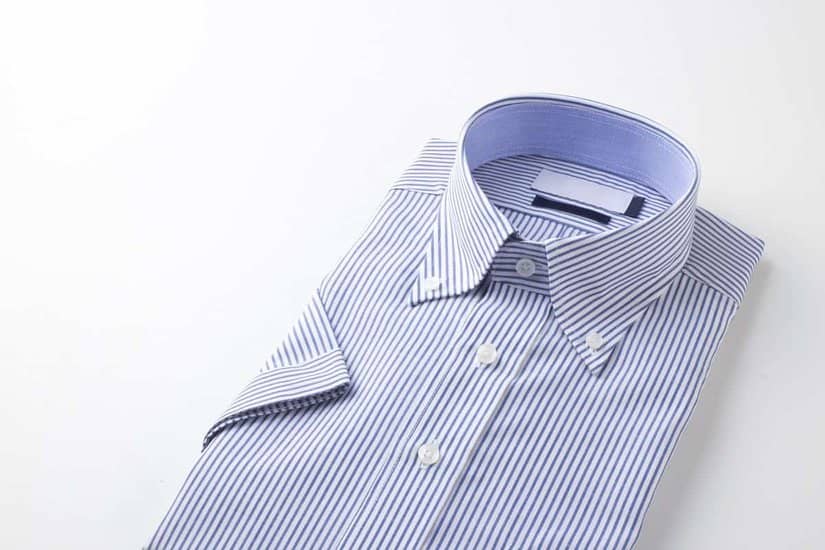Do you feel a bit like Eliza Doolittle when it comes to knowing which shirts are what? And which to wear when? Men’s fashion attire etiquette can be a minefield, almost as bad as navigating the cutlery at a royal banquet.
The blurring of casual and formal wear also further complicates matters. These days, it can be more the way you wear it than the item itself that determines whether it’s dressy or casual.
If you’d like to learn the basics of men’s dressing, read on for some tips about dress shirt vs casual shirt from the experts.
Dress Shirt vs Casual Shirt: What Identifies a Dress Shirt?
A dress shirt is technically a semi-formal shirt designed for business. When paired with a jacket and or tie, they can look more formal. Worn on their own, they qualify as business-casual.

Dress shirts come in several variations of style but can generally be identified by the following characteristics.
Length – A dress shirt is longer than a sports shirt because it is designed to be tucked into pants. You must be able to move and dance comfortably without it becoming untucked.

A casual shirt is cut shorter to be worn outside the pants. A shirt worn over pants should never hang below your back pocket. Wearing a dress shirt out could make you look like you’re wearing a dress.
Fabric – Dress shirts are made from a finer weave than sports shirts. Fabrics like high-thread-count cotton and silks are typical. They will often, but not always, have a sheen to them.

Colors – Dress shirts are usually found in subdued colors, pastels, whites, and greys. You can get dress shirts in bold colors, but they can risk appearing informal if not paired appropriately.

Patterns – Dress shirts are seldom patterned, and where they are patterned, the pattern will be a tiny scale. Horizontal stripes are informal, but a very fine vertical stripe can pass as formal (usually in blue and white.) Plaid and checked shirts are always casual.

Sleeve length – Dress shirts are always long-sleeved.

Style/cut – Dress shirts tend to have stiffer collars and cuffs. If a cuff is made for cuff links, you can assume the shirt is a dress shirt. If it has more than one pocket, it’s a casual shirt.

Dress shirts are also worn outside of business for smarter events like weddings, funerals, and graduations. Don’t confuse dress shirts with a formal shirt. A formal or tuxedo shirt is designed to be worn with a suit and bow-tie. They are always long-sleeved, button-up, with a short tipped collar. They are only to be worn at black-tie events.

What Defines a Shirt as Casual or Sports?
A casual shirt, sometimes referred to as a sports shirt, is either a button-down oxford style shirt or a polo shirt as used by golfers and other sportsmen. The latter is made of knit fabrics with a soft tab collar.

Casual shirts can be short or long-sleeved and come in a variety of colors and patterns.

Woven casual shirts are characterized by the following.
Length – Casual shirts are cut short enough to wear outside of pants and not fall below your back pocket.
Fabric – Casual shirts are made from coarser weave fabrics than dress shirts. Typical fabrics include cotton, linen, chambray, flannel, and denim. They will give a more relaxed hang to the shirt than the crispness of a dress shirt.

Colors – Casual shirts can be found in all colors.

Patterns – Sports shirts can carry bold patterns like plaids, large scale florals, paisleys and character themes. But they can just as easily be plain or subdued print.

Sleeve length – Sports shirts can be short or long-sleeved.

Style/cut – Casual shirts will have softer collars, multiple pockets, and a more relaxed fit than dress shirts.

Sports shirts do not include t-shirts or gym wear. Sports shirts are considered more formal than either of these. A fashionable casual look that’s common these days is a sports shirt worn open-necked over a t-shirt. Pair a sports shirt with a cardigan in cooler weather for a relaxed, rugged look.
Sports shirts can also be paired with jackets and/or ties. In this case, they can pass for semi-formal in more relaxed environments.
How Should Your Shirts Fit?
When it comes to fitting a shirt, there’s no distinction between dress shirts and casual shirts – both should fit well. Whatever style you prefer, there should be enough room in the shoulders and sleeves for you to move comfortably.
Buttons should never gape, so make sure this is the case, even when you’re sitting down. If you intend to wear your shirt with a jacket, the sleeves should be long enough to extend beyond the jacket’s sleeves.

Tapered, or slim-fit, shirts are fashionable at the moment. These rely on a trim waist. If you carry weight in your middle, avoid this style. A traditional fit will give you the same effect but leave you feeling more comfortable. Never select a shirt purely based on what’s fashionable.
Finally, always try shirts on before buying them. Off-the-rack shirts usually only have collar and sleeve measurements, which aren’t enough to indicate proper fit. Different styles will differ in interpretation between brands, so a slim-fit in one make might fit you, but not in another.
Accessorizing with Ties
When purchasing your shirts, keep accessories in mind. This is particularly important if you intend to wear ties with your shirts. When mixing patterns with patterns, your tie pattern should always be larger than that of your shirt. Ties should also be a darker hue than your shirt.

Make sure you don’t end up with a set of shirts and ties that can’t be worn with each other. Last but not least – you should wear ties mainly with dress shirts. If you want to wear a tie with a casual shirt – pick one with long sleeves and with no pattern on it. When wearing ties on a casual shirt – plain is the best choice. And never – never wear a tie with a short sleeved shirt – it would be a fashion disaster.
Summary
After reading this article, you should have a good idea of the difference between a dress and a casual shirt. Hopefully, we’ve also helped decipher the previously cryptic dress codes on those invitations stuck to your fridge! But if you’re still in doubt, remember this sage advice from the women’s fashion icon Vivienne Westwood, “When in doubt, overdress.”

Samoel Ovanessian is the founder and creator of StylishAlpha.com – a website dedicated to men’s fashion. As a proud owner of more than 200 ties, he loves digging through new clothing combinations for everyday use, formal events and even just for fun. You can read more about Samoel here.

